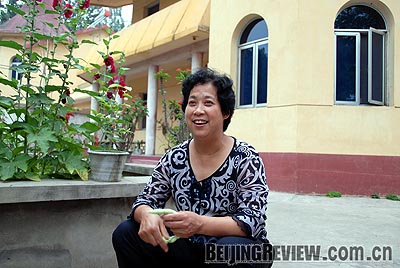|

BETTER LIFE: yang Fengyun, a Hancunhe villager, has improved her family's income by renting rooms in her villas to visitors
Many visitors come to Hancunhe in Fangshan District of suburban Beijing, a village famous for its achievements in new countryside construction. To better observe local lives and construction achievements, many stay with local families. Thirty-one families in the village provide accommodations for 200-300 visitors each day, said Zhang Yu, a guide at the Beijing Hancunhe Tourism Development Co.
Yang Fengyun, 44, and her husband and daughter are one of the 31 families in the village that open their homes to tourists. When Yang got married 20 years ago, her family of four lived in a four-room adobe house that was less than 100 square meters large.
"The only electrical appliance in the house was a radio," Yang told Beijing Review.
At that time, Yang's family cultivated about 0.15 hectares of farmland, with its annual yield just enough to pay the state grain tax and leaving the family less than 100 yuan ($14.37) in cash. Yang worked for the steel-window factory that produced materials for the village-run Beijing Hanjian Construction Group. Every month, she could earn 300 yuan ($43.10). Her husband, a carpenter, could earn a similar amount.
In 1989, the village transferred all its farmland to a collective farm and began to provide 150 kg of flour to each villager a year. That was much better than the yield cultivated by Yang's family and was enough to meet their grain demand. From 2003, the village changed its subsidy from grain to cash, said Tian Fucheng, head of the villagers' committee. The village provides a subsidy of 2.4 yuan ($0.34) for every kg of flour, 0.2 yuan ($0.03) higher than the market price, and villagers can still receive cash for each 150 kg of flour, he said.
In the meantime, Yang changed her job in 1991 and started working in a kitchen in the village's resort. Her monthly salary increased to 600 yuan ($86.21).
In 1993, Hancunhe began to build new houses for the villagers, and Yang's family moved into a newly built villa four years later. With a sale price of 400 yuan ($57.47) per square meter, the 300-square-meter villa should have cost Yang's family 120,000 yuan ($17,241.38). But because the village provided a subsidy of 30,000 yuan ($4,310.34) to every household that moved into new homes, and the villagers were able to receive free space that was equivalent to the area of their old houses, Yang's family only had to pay 50,000 yuan ($7,183.91) for the villa with a down payment of 10,000 yuan ($1,436.78). They could pay the rest at any time.
In 2003, Yang's husband quit his job and bought a truck to provide transportation services around nearby villages. She said he could earn more than 10,000 yuan each year.
Yang left the resort the following year and opened her home to tourists. She currently provides nine beds in five rooms to visitors for 60 yuan ($8.62) per person per night. She also cooks for them. Breakfast costs 10 yuan ($1.44) per person and lunch and dinner, 60-200 yuan ($8.62-$28.74) per table. She now can make more than 1,500 yuan ($226) a month.
This year, Yang's husband serves as a taxi driver in the urban districts of Beijing. He rotates his duty with another driver from the village and drives every other day. His income is about 1,000 yuan ($143.68) per month. The Yangs' 19-year-old daughter will graduate from a teacher-training school this summer and soon will become a kindergarten teacher.
Yang smiles when she talks about her life. "I had never thought that we could live such a life like now," she said. | 